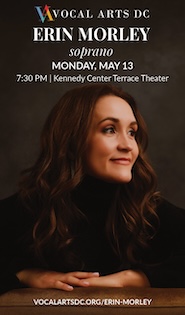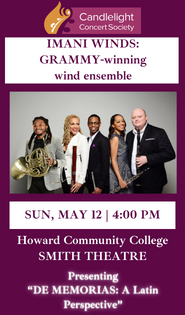Marsh makes his mark with Washington Bach Consort in “St. Matthew Passion”

Dana Marsh conducted the Washington Bach Consort in the “St. Matthew Passion” Saturday night at St. Mark’s Episcopal Church on Capitol Hill. Photo: Kate Wichlinski
The St. Matthew Passion is the zenith in the oeuvre of Johann Sebastian Bach, and maybe in all of music. For a group devoted to the composer’s music, like the Washington Bach Consort, a performance of this monumental work is a defining essential. For his first traversal of the piece with the ensemble since becoming music director in 2018, Dana Marsh led an outstanding rendition Saturday night at St. Mark’s Episcopal Church on Capitol Hill.
When Bach Consort last performed the St. Matthew Passion in 2017, Kenneth Slowik replaced the ensemble’s beloved founder, J. Reilly Lewis, who had died suddenly the previous year. Marsh has taken some time to settle into his position with the group, but in this performance he negotiated the daunting combination of two orchestras, three choruses, and multiple soloists with confident assurance. The Bach Consort finally sounded fully like Marsh’s ensemble.
The coronavirus, however, still had its part to play, with a couple of positive tests sidelining singers from the concert and requiring some substitutions. In “O Mensch, bewein dein Sünde groß,” the chorale that ends the Passion’s Part I, the chorus extolled Jesus because “The dead he gave life, and banished all illness besides.” It is a prayer we all echo.
Marsh drew a vital sound from the double 12-part orchestras in the opening movement, with an especially resonant cello and violone sound on the throbbing pedal bass lines. The two choirs of eight singers each volleyed questions and answers back and forth about the Bridegroom going to be sacrificed like a lamb. Five young women from the Washington National Cathedral Choristers took the soprani in ripieno part, adorning the chorale tunes in the opening and closing pieces of Part I with sweet delicacy.
Marsh coordinated the biblical sections of the work with crisp efficacy, transitioning from recitatives to choruses and arias seamlessly. Baritone Jonathon Adams gave resonant force to the words of Christ, which Bach always clothes in a “halo of strings,” played here with consummate warmth. Tenor Rufus Müller sang the words of the Evangelist from memory, giving searing intensity to the story-telling, albeit with some weakness in the top register.
Countertenor Reginald Mobley sang the numerous Choir I alto solos with supple tone and admirable flexibility in melismatic passages. In the aria “Buß und Reu,” his staccato notes evoked the sound of tears dropping, in intricate interplay with the impeccable flutes of Colin St-Martin and Kathie Stewart. He mollified his robust sound to pair nicely with male soprano Elijah McCormack on “So ist mein Jesus,” shaken up by violent outbursts from the chorus.
McCormack’s voice rang out with clean power in “Ich will dir mein Herze schenken,” interwoven with the outstanding oboes d’amore of Geoffrey Burgess and Margaret Owens. McCormack’s hushed rendition of the aria “Aus Liebe” in the second half was the high point of the evening. In the midst of the tumultuous shouting as Pilate decided Christ’s fate, this serene moment stood out. McCormack’s adoring vocal line was wrapped solely in the quiet tendrils of sound put forth by Burgess and Owens, now on deeper oboes da caccia, and St-Martin’s sinuous flute.
Although Mobley was effective for most of the work, the countertenor’s sound lacked the needed maternal warmth in “Erbarme dich.” The remarkable mezzo-soprano Kristen Dubenion-Smith had an urgent, pining tone on “Können tränen,” but forced the strident parts of the preceding recitative. Switching these two pieces between the two alto soloists, even though against what Bach specified, would likely have improved both of them.
The two tenor soloists, Matthew Hill in Choir I and Jacob Perry, Jr. in Choir II, both sang with heroic force and musical subtlety. In particular, Perry brought a smooth and steady sound to his aria, “Geduld,” buffeted by the stabbing cello part of Wade Davis, symbolizing the false tongues maligning Jesus and the aria’s narrator.
Bass Edmund Milly was a piercing Pilatus, also filling in with admirable strength for his ailing colleague in “Komm, süßes Kreuz,” in spite of some shakiness on the viola da gamba obbligato. (This moment in the St. Matthew Passion is depicted in the gorgeous Tiffany window above the musicians’ heads, a scene of Christ leaving the Praetorium and Simon the Cyrene taking up the cross.) Katelyn Aungst’s pointed soprano worked ideally for the poignant aria “Blute nur.”
David Rugger’s plangent bass was ably supported by the violins in “Gerne will ich mich bequemen,” but the ensemble was less certain in his “Gebt mir meinen Jesum wieder,” with some logy playing from violinist Tatiana Chulochnikova. Bass Jason Widney pleaded with self-accusation as Petrus and also covered the other aria, “Mache dich,” for his ailing colleague, with musicality if not quite the needed force on the lowest notes.
The St. Matthew Passion will be repeated 4 p.m. Sunday at St. Paul’s Lutheran Church. To celebrate its return to the renovated National Presbyterian Church next season, Washington Bach Consort will perform Handel’s Messiah, Bach’s Christmas Oratorio and Mass in B Minor, and a world premiere by Trevor Weston. bachconsort.org



